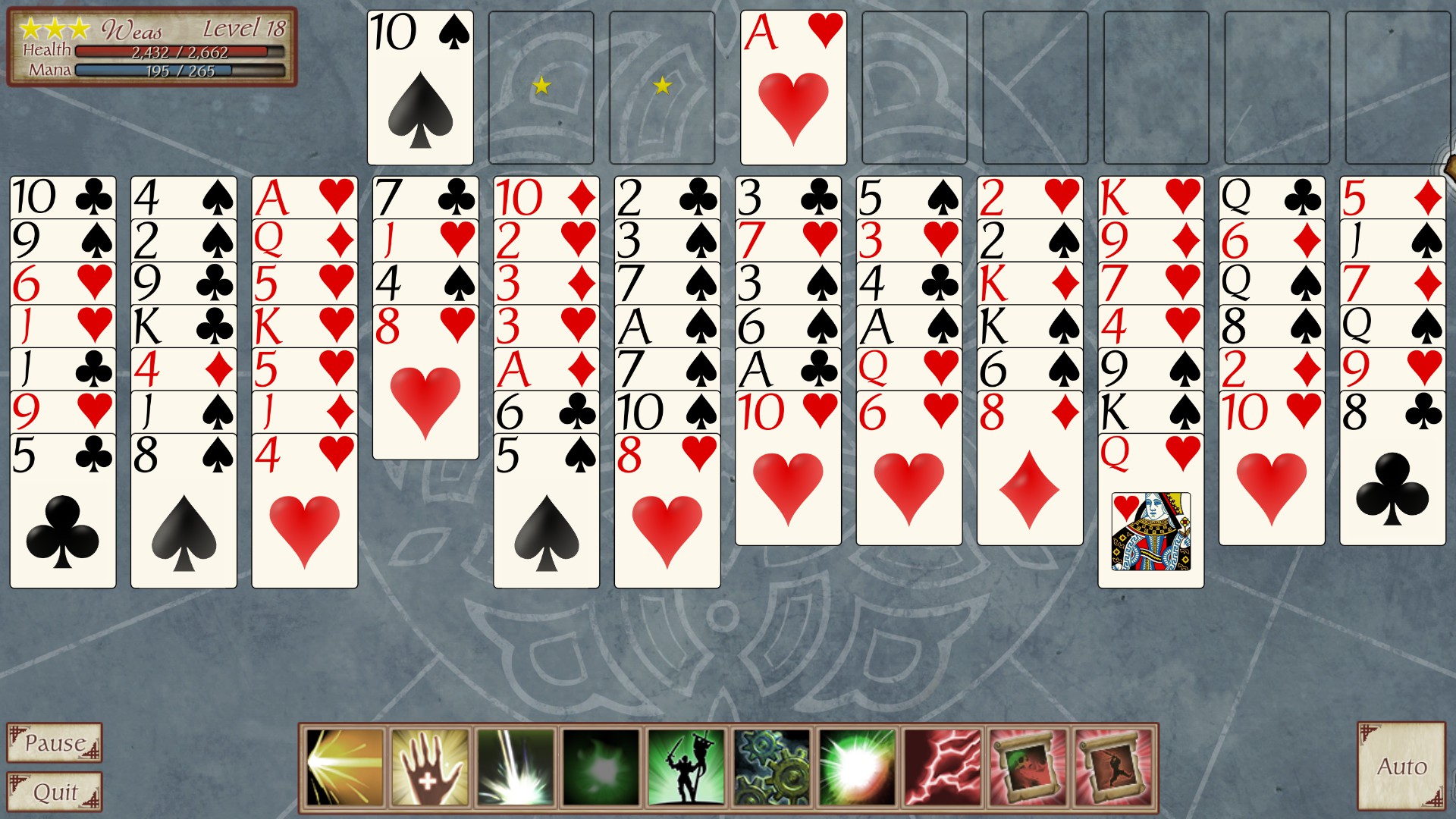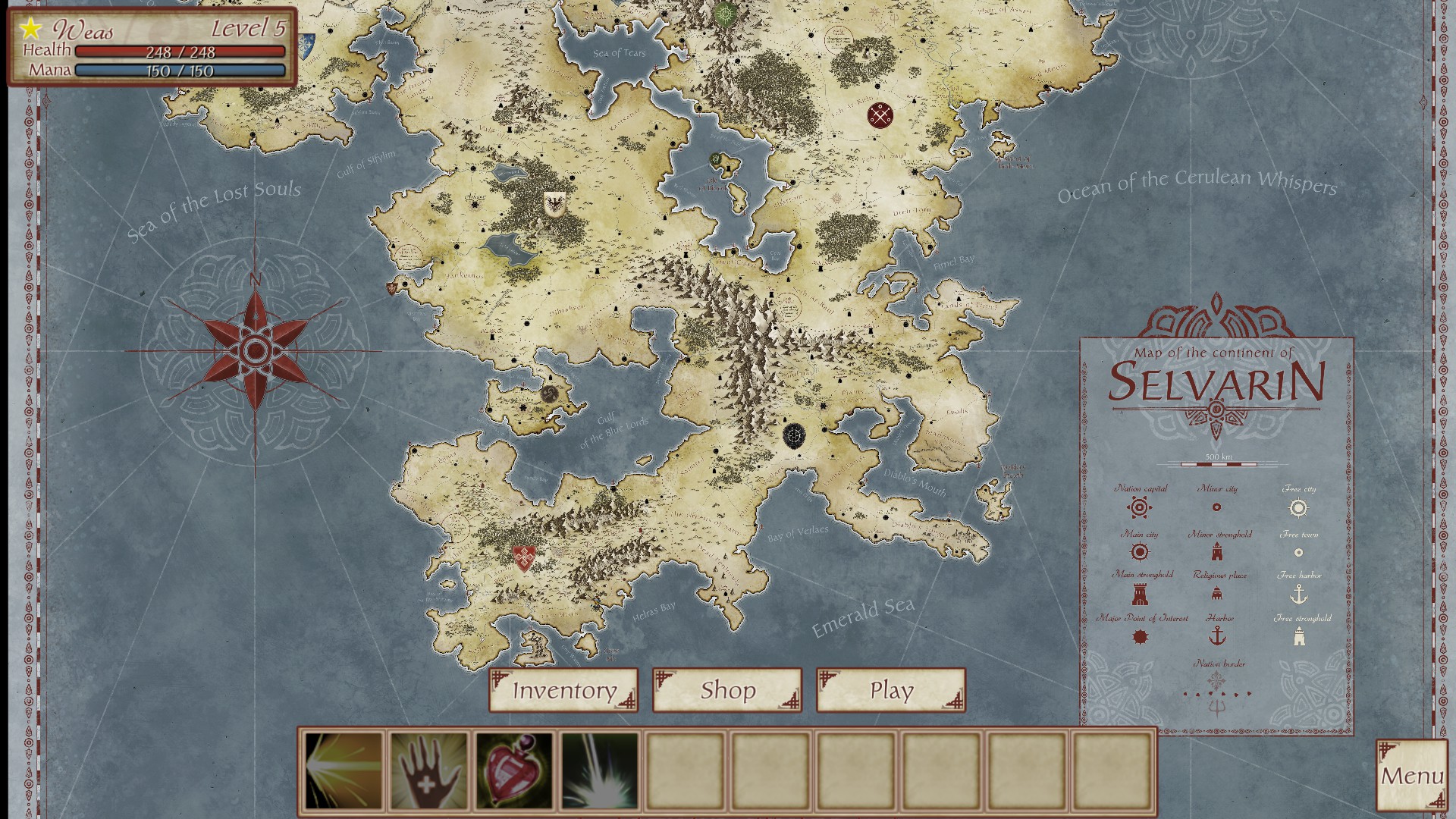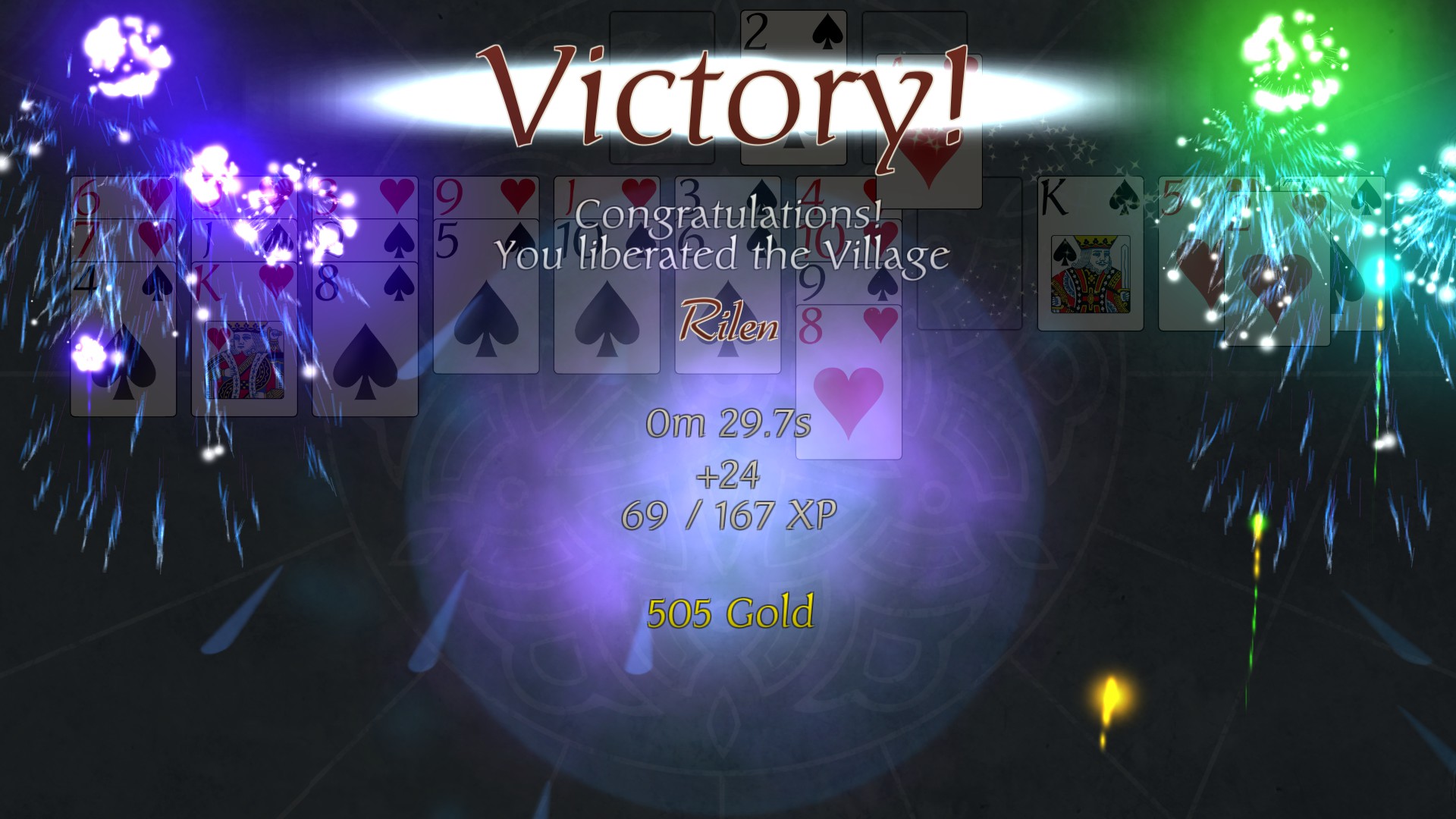How purposeful can solitaire get? Beyond achievements, romance, or cross-country road trips, why not the Hero's Journey? Or I suppose that's a misnomer - the actual "hero's journey" (i.e. the storytelling device) doesn't really have any stake in FreeCell Quest, as FreeCell Quest doesn't actually have a story (beyond what's on the Steam Store page, anyway). You are a generic fantasy person, and your Quest (FreeCell Quest, that is) is to liberate the continent of Selvarin with your Magical Solitaire Playing Powers. Developer Legend Studio (no relation to Legend Entertainment, creators of DOS adventure games like Gateway, Spellcasting 101, and Superhero League of Hoboken) are calling FreeCell Quest an "RPG FreeCell game" - and they mean "RPG" as in "character stats and numbers," not so much about the story.
FreeCell Quest starts with you playing what amounts to regular, unaided FreeCell, albeit with only 2 suits and 2 cells. The amount of suits (and tableau piles) is dependent on the difficulty level of the town you're liberating; the hardest towns in the game are full-size, 2-deck games with only a small amount of piles to weed through, while the easiest are 2-suit games with 10 or more tableau piles to work with. But as this is an RPG, there must be some tangible benefit to gaining levels, so you steadily gain Health and Mana with every level you gain. The purpose of these isn't immediately clear, as you're unlikely to be "attacked" while playing early on, and you only start with a tiny handful of spells that don't cost much. But as you advance, you'll start learning spells that enable you to shuffle a single tableau pile, move all the Kings to the backs of their respective piles, send random cards to the foundation, or pull a card forward in its pile. And eventually, yes, the cards will start trying to kill you(!).

A deck-and-a-half of Freecell taking up an entire HD 1080p screen. This might take a while to get through...
The way combat works in FreeCell Quest, if it can really be called "combat," is that occasionally a random card will start glowing with a dark energy, flashing black. If you don't dig down to that card within a certain (unspecified) time limit, that card will damage you. It is possible to stop an attack in progress if you manage to make the glowing card movable (either by digging it out from where it's trapped, or by freeing up enough open cells and tableau piles), or if you cast the Fizzle spell (which costs mana, which doesn't regenerate).
The problem is, harder deals can result in a lot of cards being trapped, which means you'll be casting Fizzle lots of times in your average deal, due to not being able to free them. Once you've got a hundred or so wins under your belt, running out of mana starts becoming a pretty significant problem. The number of ways you can get just plain stuck during a deal means that you're going to wind up using your spells very, very frequently, and unless you're spending money on mana potions (which are expensive!), a game could become unwinnable as a result of being unable to "save" it with your spells (i.e. cheats with a mana cost, I'd argue). Then you're reduced to either retreating (abandoning your progress, while the amount of mana you wasted is still wasted), or letting the cards kill you, penalizing your gold total, and sending you back to the last inn you stayed at...which, given inns are only at Capitols, could be back at the beginning of the game!

The world map. Each city on the map is one game of FreeCell. There are hundreds of those cities. Completionists might be at it for a very long time.
In RPG tradition, you're expected to gain levels to become more powerful, so you can fight more powerful foes. Foes are typically considered powerful because they're capable of utterly stomping weaker players that aren't prepared to deal with them. FreeCell Quest doesn't have "enemies," per se; it has appropriately leveled towns. While a town's difficulty is measured by how many suits and piles it has, and how difficult the "sort" is (i.e. whether you have to dig all the way down in order to get at the Aces and other important cards), towns are also given levels, which affect how much damage you take if a card's attack manages to fire. You could, in theory, attack a level 20 town at level 1, if you had an appropriate arsenal of spells. However, if even one attack fires at you, that attack is likely to deal several hundred times the amount of health you have at that low a level. The time it takes an attack to fire does not change at all, so you could feel as if you're perfectly safe. But once you've run out of mana, and one card starts glowing from the very bottom of a 14-card pile, and you notice that the fireball has just done 5,000 damage to a character with only 250 hit points...can we say "ouch"?
As far as I can tell, FreeCell Quest originated as a mobile game, and was released to Steam shortly thereafter, under a "Deluxe Edition" moniker. Mobile versions are free-to-play (ad-supported, I'm told), while the Steam version has no ads and introduces multiple player classes. The Steam version of the game also recently updated to add in-game purchases - yes, in a PC game that already costs $10 - for 100% cosmetic alternate decks. I've complained about in-app deck purchases before, and it's much more prevalent in modern solitaire than just this game, but this is among a very small handful of solitaire games for PC (not mobile, where this sort of marketing is expected and dare I say encouraged) that does the in-app purchase thing. In this case, the deck purchases are handled as Steam inventory items, meaning that you can buy them with Steam Wallet money from the Steam Trading Cards the game dispenses, and after a week of owning a deck, you can then sell or trade it to another player. How well does this work in practice? Well, the only players who have FreeCell Quest decks on the Marketplace have them priced at $2.10 as of this writing, for decks that cost 99 cents in game, and the only players in the Marketplace that have indicated wanting the decks are only willing to pay 10 cents for them. I've already stated my dissatisfaction in needing to pay money for what amounts to bitmap image files, but this just dissatisfies me on so many levels.
But somehow, despite it all, I find that I keep going back to FreeCell Quest. I am not even sure why; I dislike the "combat," don't like the game's heavy reliance on spells (cheats), and I'm not the biggest fan of the aesthetic, either. There are tiny little quirks and bugs with the game (sometimes a card I drop on a pile doesn't want to drop on that pile even though it's a valid move) that add up to me wondering why I'm even playing. Yet, for some reason, I keep going back. Maybe it's true that RPG-style progression gives you a reason to keep playing. But if you ask me, there's got to be a hundred other ways to implement it that don't involve adding arbitrary do-or-die time limits to the game.

This is what I call "too much fanfare."
If, for some reason, I haven't managed to dissuade you from FreeCell Quest, you can find it on various storefronts for an assortment of platforms.